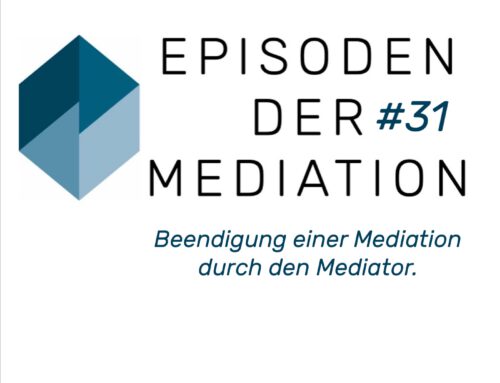Effectiveness of mediation in the world of work (2019 study)
What effects does mediation have on conflicts in the workplace – in the short, medium and long term?
Summary
This was unclear for a long time. Although the experiences of mediation participants were regularly positive (as described), it was still completely unclear, whether and to what extent mediation also has a positive effect in the medium and long term. This is exactly what a study has now investigated. It was found that
- Mediations both short-term and long-term
- are viewed positively and effectively by the parties involved with regard to the regulation of conflicts – namely…
- regardless of the hierarchical position
- and the outcome of the mediation, i.e. whether labour relations are restructured or terminated!
The supervisors' assessments do not differ significantly from the assessments of the other participants – for both separation and organisational mediation. This is both surprising and reassuring!
Listen to contribution
Mediation for conflicts in the workplace – what was previously known
The following were analysed So far the short-term effects of mediation in the workplace.
It has already been confirmed that mediation in the workplace achieves high agreement and termination rates. The agreement rates in the underlying studies were always between 60-80% (Swaab/Brett 2007, Wood/Leon 2009, see literature).
The differences were regularly attributed to the qualities of the mediators, the extent to which the conflict had already escalated and which incidents were ultimately the subject of the dispute.
Previous studies have also shown that superiors were regularly more satisfied with the mediation process than their subordinates. There were also differences with regard to the assessment of the mediation process. Recognition and appreciation by the mediator of anger (expressions), for example, had a significant boost in satisfaction on the part of subordinates, while this was not as valuable for superiors.
Until now, it has been unclear to what extent the satisfaction of the mediation participants has been maintained over time and which effects persist after a longer period – after six months or even after a year –.
If you want to know the long-term effects of mediation,
must query memories
and not satisfaction with the present:
Research questions and findings of the study:
What are the links between the short-term effectiveness of mediation and its long-term effects?
The mediators who looked back on the mediation after one year (and answered the questionnaire!) rated the effectiveness almost the same. The Assessment of satisfaction with the mediation process, the outcome and the mediator remained the same and did not change significantly. This applies to conflicts at one hierarchical level as well as conflicts with hierarchy, and the assessments of both superiors and subordinates were almost identical. Supervisors were only more optimistic when it came to questions about implementation.
The only difference in judgement over time was with regard to the Mediation process. The details appear to become blurred after one year and the respondents assess their satisfaction differently than shortly after the mediation. However, the researchers do not consider this difference to be particularly significant because satisfaction with the outcome of the mediation and with the mediator have an overlapping effect. According to this study, it can therefore only be concluded that satisfaction following mediation cannot be used to infer subsequent satisfaction.
Memory reflects the present, not the past.
What influence does it have on the assessment of the effectiveness of mediation if it is a separation mediation and if it is a design mediation?
As Separation mediation (=exit mediation) This refers to mediation in which the parties to the conflict no longer (have to) work together and, in extreme cases, one party has left the company. In the case of Design mediation The mediation and final agreement centres on how the working relationship can be restructured and that agreements on change have been reached.
It makes no difference to the satisfaction of the parties whether the mediation ends or shapes the collaboration. The success criterion of "reconciliation" was also recognised by both managers and employees as a key factor in the long-term effectiveness of mediation. Least important assessed.
That is highly remarkableAccording to some researchers and mediators, continued cooperation should be favoured, as social cooperation is more important than ending it. But this does not correspond to the research results of this and other studies. Whether this is because relief at the end of an exit mediation increases satisfaction („Better an end with horror than a horror without end…“) or whether a „conciliatory farewell“ is in itself satisfying („If you want to get to know the whole world, you have to learn to say goodbye.“), can remain open here. Important for mediators is, that they conduct exit mediations with the same enthusiasm can be like design mediation. They create the same „added value“ for the parties or otherwise; mediants staying together and re-organising their relationship is not worth more than if they separate and enter into new relationships. Nevertheless, this assessment can be a challenge for mediators.
What influence does the hierarchical position of the participants have on the long-term effect of mediation?
Firstly, there are no significant differences between employees and line managers in terms of satisfaction with the process, the results and the mediator themselves.
There are only differences in the long-term assessment of implementation results. Managers rated the fulfilment of agreements more positively. The researchers assume that this is either due to the phenomenon that the position of the powerful generally goes hand in hand with an increased level of optimism. Or that the subordinates' more intense feeling of being bound by agreements means that they are less satisfied with their implementation. They take them more seriously and probably also perceive them in more detail…so that deviations carry more weight. However, the study does not show this so clearly.






Leave A Comment